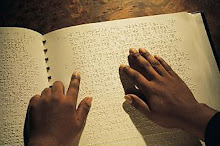Here is the article that I wrote about for last week's assignment.
My full reaction is posted as a comment to this entry. It may seem a bit strong, but there's an important point here about watching the way "we" frame the tribulations of "others."
-Pete
Moved
12 years ago

2 comments:
At the end of the current baseball season, the New York Mets will no longer live in their long-time home, Shea stadium. No doubt many will miss the old park. Some may even be downright mad about it. Times reporter Ken Belson brings us the perspectives of visually impaired fans Bobby and Kevin Grogan, whose woes are more practical than nostalgic. Being able to see nothing more than a few feet past their faces without the aid of telescopes, Bobby and Kevin have spent their whole lives learning the ins and outs of Shea. They will soon have to scrap that work and start all over.
The element of tokenism comes up here in two conflicting ways. It appears that the article itself is giving some visibility to problems faced by the visually impaired. However, the overall tone of the article is more that of a cutesy human interest piece than of an expose - so that, where we might be inspired to ask why no consideration is given, in decisions to shut down old buildings and venues like Shea, to folks like the Grogans, we instead marvel at the tenacity of such rare folks and pat our own backs for taking a moment to care.
Rare is the key word.
While describing the view of a small minority population, the article does so in a way that underhandedly reenforces the defined norm of sightedness. Again the key here lies in the tone of the piece. It is strictly human interest. There are no figures cited for ballgame attendance by the blind or visually impaired. There is no discussion of whether or not any accommodations for such individuals would or should be considered for the new Citi Field. The Grogans weren't even asked what such accommodations might be like. In fact, by treating their case as something which is interesting on it's own - as an oddity - The article seems to suggest that blind or visually impaired people very rarely care to take in ballgames. It says, in effect, "yeah, it's tough for these guys, but they deal with it fine on their own - heroically, in fact - and, besides, we don't seem to find that anyone else is being affected in this way." They may or may not have looked.
I have read many newspaper stories which take this approach to some large social problem. The problem is shown us through a microscope, so that we can't see it's breadth. We say, "oh, what a unique exception to the defined norm," and then remove our eyes from the lens, casting the subjects back into darkness. This is done with a middle-class family buried in medical bills or a dual-earning couple of fast food workers who can't make their rent. Their stories are treated as a slice of life, a somewhat artistic sketch which makes little reference to the rest of the pie. Tokenism is the result. The threads that weave individual problems into the social fabric are hidden from view.
Hey Pete, I really enjoyed reading your reflection. That last paragraph made me reevaluate my own reactions to articles like these. I admit to thinking "how rare and sad!" before considering that the story I read about a struggling individual or family may actually be evidence of a much bigger problem.
And a question for this whole blog group: has anyone spoken to a blind person in Austin about how bad the sidewalks are in some areas? I have been noticing people on motorized wheelchairs in the bike lanes of west campus (possibly because people on foot can barely get by without tripping at least once), and now I'm wondering how this affects the blind. Any thoughts?
I really like your blog so far!
-Sarah Whitby (swforelderly.wordpress.com)
Post a Comment